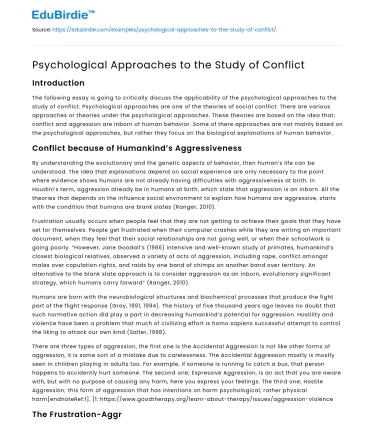Introduction
Conflict, an inherent aspect of human interaction, manifests across various domains from interpersonal relationships to international diplomacy. Understanding the psychological underpinnings of conflict offers valuable insights into its causes, dynamics, and resolutions. Psychological approaches to the study of conflict encompass diverse theories and methodologies, reflecting the complexity of human behavior and cognition. These approaches illuminate how individual perceptions, cognitive biases, and emotional responses contribute to the emergence and escalation of conflict. Moreover, they provide frameworks for conflict resolution by addressing underlying psychological factors. This essay explores key psychological approaches to conflict, emphasizing cognitive, social, and emotional dimensions. It also addresses counter-arguments, highlighting the limitations of psychological explanations and the need for interdisciplinary perspectives. Ultimately, this discussion aims to demonstrate the critical role of psychology in understanding and resolving conflicts effectively.
Cognitive Perspectives on Conflict
Cognitive psychology emphasizes the role of mental processes in understanding conflict. It focuses on how perception, memory, and reasoning influence individuals' interpretations and responses to conflict situations. Cognitive biases, such as confirmation bias and attribution errors, often exacerbate conflicts by distorting perceptions. For instance, confirmation bias leads individuals to favor information that supports their pre-existing beliefs, potentially intensifying disagreements. According to Ross and Nisbett (1991), these biases contribute to the entrenchment of opposing views, making conflict resolution challenging. Cognitive-behavioral therapy (CBT) offers a practical application of cognitive psychology, providing strategies to alter maladaptive thought patterns and promote constructive conflict resolution. By addressing cognitive distortions, CBT facilitates a more balanced understanding of conflict issues. However, critics argue that cognitive approaches may overlook emotional and social factors, which also play crucial roles in conflict dynamics.
Save your time!
We can take care of your essay
- Proper editing and formatting
- Free revision, title page, and bibliography
- Flexible prices and money-back guarantee
While cognitive approaches provide valuable insights, they may not fully account for the emotional intensity that often accompanies conflicts. Emotions such as anger, fear, and frustration can drive conflict escalation beyond rational comprehension. Hence, it is essential to integrate emotional and social dimensions into the analysis to achieve a comprehensive understanding of conflict. Despite these limitations, cognitive perspectives remain instrumental in identifying thought patterns that contribute to conflict and devising interventions to mitigate their impact.
Social Psychological Approaches
Social psychology explores how group dynamics and social contexts influence conflict. It examines phenomena such as social identity, group polarization, and intergroup conflict. Tajfel and Turner's (1979) social identity theory posits that individuals derive part of their self-concept from group membership, leading to in-group favoritism and out-group discrimination. This can result in intergroup conflicts, as seen in ethnic or religious tensions worldwide. Sherif's (1961) Robbers Cave experiment further illustrates how competition for resources fosters intergroup hostility, while cooperative goals can reduce conflict. Social psychological interventions often focus on promoting intergroup dialogue and fostering empathy to bridge divides. Critics, however, argue that such approaches may not adequately address structural inequalities that underpin many conflicts.
While social psychological theories offer valuable insights into group behavior, they may underestimate the role of individual agency and personal motivations in conflict situations. Interventions based solely on social psychology might not address the deeper emotional and cognitive factors driving individual actions within groups. Consequently, a holistic approach that incorporates multiple psychological perspectives is essential for effective conflict resolution. Despite these challenges, social psychological frameworks remain crucial for understanding the collective dimensions of conflict and designing interventions that promote social cohesion.
Emotional Dimensions of Conflict
Emotions profoundly impact the onset and escalation of conflict, often driving behaviors that rational considerations cannot explain. Emotional intelligence, defined as the ability to recognize, understand, and manage emotions, plays a pivotal role in conflict resolution. Goleman (1995) emphasizes that individuals with high emotional intelligence are better equipped to navigate conflicts by managing their emotions and empathizing with others. Emotional regulation strategies, such as mindfulness and self-reflection, can reduce emotional reactivity and facilitate constructive dialogue. Despite the significance of emotions, some scholars argue that focusing solely on emotional factors may overlook the broader social and cognitive influences on conflict.
The emotional dimensions of conflict highlight the need for interventions that address both individual emotional responses and the broader relational context. Balancing emotional regulation with cognitive and social strategies can enhance conflict resolution efforts. While emotional approaches provide crucial insights, they should be integrated with cognitive and social perspectives to ensure a comprehensive understanding of conflict dynamics. This integration not only enriches theoretical frameworks but also informs practical interventions aimed at fostering sustainable peace.
Conclusion
Psychological approaches to the study of conflict offer diverse perspectives that illuminate the complex interplay of cognitive, social, and emotional factors. While cognitive approaches highlight the impact of mental processes and biases, social psychology emphasizes the influence of group dynamics and social contexts. Emotional dimensions underscore the role of affective responses in conflict situations. Each perspective provides unique insights, yet their integration is essential for a holistic understanding of conflict. Addressing counter-arguments and acknowledging limitations, this essay underscores the importance of interdisciplinary approaches that incorporate psychological insights alongside sociopolitical, economic, and cultural factors. Ultimately, by embracing the multifaceted nature of conflict, psychological approaches contribute significantly to developing effective strategies for resolution and promoting lasting peace.






 Stuck on your essay?
Stuck on your essay?

